Gavin Duley's Weblog
Still nothing of interest
Photo Gallery
Weblog (RSS)
Interests
UK Farming Crisis
What's new?
Links
Contact me
External (open in new window)
Librarything profile
Snooth profile
Twitter (RSS)
Old posts:
May 2013 (1)
Apr 2013 (1)
Oct 2011 (6)
Sept 2011 (1)
Aug 2011 (1)
Jul 2011 (27)
Categories:
/books
/botany
/cars
/cars/oldcars
/computing
/computing/android
/computing/mac
/computing/unix
/music
/photography
/photography/cameras
/photography/experiments
/soporific
/stuffisaw
/stuffisaw/error_messages
/this_site
/travel
/travel/australia
/travel/australia/south_australia
/travel/france
/travel/france/burgundy
/travel/uk
/wildlife
/wine
/wine/oenology_diploma
/wine/vintage2011
07 2011
Sun, 17 Jul 2011
Out of memory!
I guess this is a continuation of my Android phone review.
One thing has been somewhat annoying me about my Android phone recently.
No, it's not constantly receiving calls from my Aunt Agatha.
That's Bertie Wooster you're thinking about there.
It's this friendly little icon:

That's the one that tells me my phone thinks it's running low on space
on its inbuilt memory. Normally there is a few megabytes spare when it
starts to complain, but maybe that's not enough. It's normally
just one partition that's starting to run low, the others tend to be okay.
Of course, there is over a gigabyte free on the memory card, but that
can't be used for anything other than storing files (photos, music, etc).
Sometimes the problem goes away if I just wait for a bit. Sometime rebooting works.
I guess this suggests that temp files are at least part of the problem.
This is annoying for two reasons. One is that it means I have to keep the
number of apps I have installed strictly limited. There's an exciting
new app out and you'd like to try it out
(e.g. ... Google+)?
Forget it. I'm down to ones
that I use all the time, plus a few extra (Google Sky Map! I don't use it
often enough, but it's too good to remove).
The other is that, when the phone is low on space, I can't receive emails
or text messages. Potentially very annoying.
Can I blame Zoidberg for this?
posted at: 04:32 | path: /computing/android |
permanent link to this entry
Fri, 01 Jul 2011
The End of the 2010 Vintage
For me, the vintage is effectively over now. Okay, it's not really -- others will be processing
Touriga Nacional for a port-style wine later in the week, though sadly I won't be able to join in.
All of the wines I've been involved in making our now in barrel, and the chardonnay juice is now
in the freezer and waiting for another group later in the year to make it into wine.
I thought I'd share a few photos I've taken during the vintage period, and meant to post, though.
Here is a very small Potter fermenter. We didn't end up using this, but I couldn't help wondering how
long it takes a baby Potter fermenter to grow up to be big like the ones in the background:
Also, I liked this baby airbag press:
Well, I've not been all that great at blogging this vintage. I'll continue to post bits and pieces as
they happen, though.
posted at: 01:50 | path: /wine/oenology_diploma |
permanent link to this entry
New Arrivals
Well, this is the first time I've been somewhere in Australia that isn't
along the eastern coast since... since before I can remember. Since
getting back to this country at the start of 2003, I've just been
messing around on the eastern edge of the continent. Well, that's all
changed now. Temporarily.
I'm in Adelaide for about a week, for the Australian Systematic Botany Society 2008 National
Conference. The excitement doesn't start until Sunday, I got here a
earlier so that I could look around Adelaide a bit.
I had been warned(?) in advance that Adelaide was designed by the same
man as Christchurch in New Zealand. According to Wikipedia this isn't in fact the case, but walking along the river
I did get a certain sense of deja vu, the city feeling more
like Christchurch than any other Australian city than I am used to. This
doesn't explain why I kept thinking that the traffic would be driving
on the right, maybe I was subconsciously being reminded of a European
city.
The walk along the river was pleasant, and graced by musk lorikeets
(Glossopsitta concinna)
and Australian Pelicans (Pelecanus conspicillatus).
In a tree, noisy miners were raising a nest-full of appropriately noisey nestlings. The next was part twigs, part plastic: old shopping bags fished from the river, having
finally found some use.
I crossed over the river on a rather ornate bridge, and walked across
the fields. My attention had been drawn by church spires, by analogy
with Christchurch, there should surely be some sort of square out in
front. Sadly, the analogy did not stretch quite that far. Walking across
the fields, though, I found a juvenile magpie using the tried-and-tested
"nearly tread on it" method of bird detection. There were adult magpies
lurking nearby, I could but hope that at least one of it was the
juvenile's parent. Though no longer a chick, I don't think it was quite
up to looking after itself.
The delusion that I was in Christchurch was more or less dispelled by
the CBD. I didn't really look around the city centre much, though, but
headed straight for the South Australian Musuem. Sad thought it may sound,
this was one of the main reasons that I had arrived those extra few days
early. Here, they have some very rare and unusual fossils indeed - trace
remains of the first animals ever, from the
Ediacaran period -- some 650
million years ago. It's something quite special to see, and think
how long ago they lived. That the imprints of soft bodied organisms have
survived so long is quite amazing. It's incredible to think that these
ghostly shapes in the rock could well have been the ancestor of all of
us. Debate still rages as to if, and how, these things are related to
modern life. That they don't really look like any thing that you would
see out there today still is undebatable.
This wasn't the only thing to see at the Museum, and I enjoyed looking
through the Pacific Islands cultures exhibition, and the extensive and
brilliantly done exhibition of Aboriginal Australia.
Then I capped off another amazing day by getting the wrong bus back to where
I'm staying.
This is where it helps to have made a note of what bus you got into town
on.
Adelaide photo gallery
posted at: 01:50 | path: /travel/australia/south_australia |
permanent link to this entry
Picking the 2010 Waite Shiraz
I helped out with picking the Shiraz (aka Syrah) allocated to my group from
the Coombe vineyard on the Waite Campus today. We started picking at about
6:30, and I carried on until 10:00 when I had a lecture I had to attend.
Others carried on until all our three and a half rows were picked, and
we had around a tonne of fruit.
The fun part of this for me getting up at 5 am. It's something I can do
if I have to, but I certainly don't enjoy it. It was worth it, though, once
I got out into the vineyard.
South Australia has experienced a really hot year this year -- again -- and
this was particularly evident from seeing how some of the grapes were
shrivelled on the vine. Here is the worst example I found:
... but that was the exception rather than the rule. More common were
bunches where a percentage were burnt, and the rest were fine:
As the burnt grapes will be removed by the crusher-destemmer, we were told it
was fine to include them with the picked grapes.
Also, we can haz tractor! Luckily for everybody, I wasn't allowed to drive it ;-)
Next week sometime, we'll pick the Mataró. I've got so many classes next
week, I'm not certain I'll manage to do much towards that, which is a shame. I'm not
the fastest picker by a long way, so I doubt it'll make much difference to how quickly
the grapes are picked, but (in short stretches) it's an interesting thing to try.
Next challenge: actually making this into wine.
posted at: 01:50 | path: /wine/oenology_diploma |
permanent link to this entry
New Address for this blog!
I haven't been updating this blog at all recently, partly due to time,
partly due to problems getting the plugin 'moreentries' to work.
I've given up on moreentries, and am using flatarchives and categorylist instead
(see side menubar).
In other news, this weblog is now hosted on my own server at
http://blog.wodewose.org. But, given that you're
reading this, I presume you've noticed already...
posted at: 01:50 | path: /this_site |
permanent link to this entry
DIY Kaleidoscope
This one could fit under "do try this at home".
A few weeks ago, my father bought some longish, square metal poles for some DIY around the house. At the hardware store, I noticed that these made quite a good "DIY kaleidoscope":

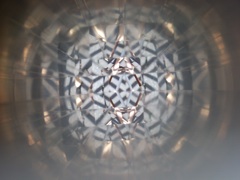
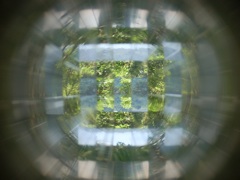
Here is what the pipe looks like:
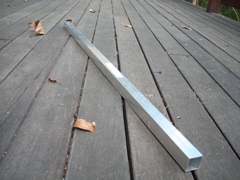
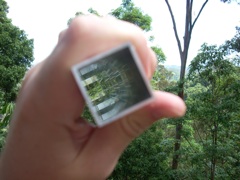
The photos themselves aren't really very good, but it was an interesting little experiment just to see if I could get an interesting photo that way. Next time, I think I'll try a camera that gives me a bit more manual control than the little point-and-shoot Nikon Coolpix I used for this.
The other problem I will have to overcome is one of wobble: as I was holding the camera with one hand, and the metal tube with the other, both were wobbling and in different directions and to different extents. This made it a bit harder to get a steady photograph...
posted at: 01:50 | path: /photography/experiments |
permanent link to this entry
On the train
On the train to Newcastle, winter landscape flashing by. Cold reflections in fallow fields, winter villages huddled around churchyards.
Slowly through towns, speeding past hedgerows. Empty platforms gone in a flash of station signs and sodium light.
Somehow the landscape reminds me of Jonathan Strange and Mr Norrell, as if I
can see the Raven King's words written in the empty fields and the grey sky. Even though we're not far enough north to be North, not yet.
Ah yes, here comes the trolley with tea and Mars bars. Enough to break anyone out of thoughts of the Raven King...
posted at: 01:50 | path: /travel/uk |
permanent link to this entry
The best way to set up a new VPN...
This looks like the best way to set up a new VPN to me... :-)

(Comic from xkcd.com, with thanks).
posted at: 01:50 | path: /computing |
permanent link to this entry
Ray Bonneville - "The Big Easy"
One of the things I intended to do when I fist set up this weblog
was from time to time post YouTube videos I'd come across and particularly
liked. I'd been meaning to link to one or two songs by
Ray Bonneville, a
Cajun/Blues musician who I stumbled across thanks to the power of YouTube(tm).
One of my favourite songs at the moment is his song "The Big Easy", which is about
New Orleans -- in particular about the recovery after the disastrous floods there.
Here are two different versions. The one I first saw:
And a more recent version:
I now have a copy of his CD Goin' by Feel, and sometimes have to stop myself
from singing along... It's a great CD.
These videos from YouTube are not copyright to me, and are used with thanks.
posted at: 01:50 | path: /music |
permanent link to this entry
Pressing Adelaide Hills Chardonnay
Almost a month without a weblog post. Not that there's been nothing to write
about, rather there has been too much and hence no time. Oh well.
Today I helped press some Adelaide Hills Chardonnay. I'm not going to be
making this into wine, other students will do that later in the year. I benefited
from this myself late last year, when I was able to use juice pressed by
earlier students to make some white wine with another group in second semester --
a useful introduction to winemaking.
My group was the first to press today, starting at 7 am. I don't often go for walks
at 6 am, as I did this morning to get to the bus, but I always I enjoy it when I do.
The sky was just lightening enough to differentiate from the still dark land,
and dark clouds were breaking up to show patches of lighter sky. There is a poetry
to this time of morning which is quite unique. Certainly, it was a beautiful
walk, and I was just sad I had to hurry to catch the bus.
Two groups pressed at the same time. We wanted to whole bunch press, but the grapes
had been machine harvested so few were still in bunches. We did not use the crusher
destemmer, though, so we sort of whole berry pressed I guess you could say.
Grapes being poured into the press
We used an airbag press, which can be less oxidative if used in conjuction with
sulfur dioxide. Our group processed our fruit oxidatively (no sulfur dioxide at press, though
we added some afterwards to protect against spoilage), the other did theirs
reductively. It was interesting to see the differences.
What else? Oh, yes, as the grapes were machine harvested there was a certain
amount of "matter other than grapes" (MOG). I can predict that this wine would pair
well with escargot:
Snail shell in with the grape marc
Well, the early start is really starting to have an effect on me. I think I'll be having
an early night tonight. Anyone I've sent emails to tonight -- I've probably made
some really stupid mistakes due to being half asleep! It's not a good idea
to start emailing people when you're not really awake, I guess.
posted at: 01:50 | path: /wine/oenology_diploma |
permanent link to this entry
Phone review: Samsung Galaxy i5700 (aka Samsung Spica)
Originally posted: 5 July 2010
Updated: 4 Jan 2011
I've been meaning to write up a brief review of my new phone for a little
while, here is my first attempt ;-). I'll probably update this as I think of new points to add.
Introduction
I recently bought a new phone, to replace my Sony Ericsson K750i. Initially
I bought a HTC Tattoo, but for some reason I ended up with a 2G version of this
phone. I was able to replace it with a 3G Samsung i5700. Since I'm fairly familiar
with these three phones, most of my comparisons will be with these phones.
Reasons for upgrading from the K750i
I wanted:
- A larger screen and touch-screen based interface;
- The Google Android operating system, which has a wide range of useful apps;
- GPS, with the ability to run navigation software such as NavIt;
- Mobile email and web access.
- 3G (now that 4G is on it's way, I thought I should finally upgrade to a 3G phone...)
One thing I did not get from the upgrade is a better camera. The camera on the Sony Ericsson K750i is very good, and even though the Samsung has a 3.2 megapixel camera, it isn't quite as good as the 2 megapixel camera on the Sony. Both are better than the HTC Tatto, which lacks autofocus.
The phone
As a phone, it works pretty well. Once or twice, I've had it bring up the keypad whilst I'm talking on the phone and start dialling numbers, but it locks the screen after I've been talking for a minute or so which normally stops this. The way that my address book and calender are synced with my Google account automatically and wirelessly is great, and very useful.
The web browser is pretty good too, though sometimes it misinterprets my attempts to scroll down a page as zooming. I'll probably get used to this with practice, though. Both email clients (GMail and non-GMail) are good, and the push email facility with the GMail client is very handy. Both share the handicap that both force you to use top posting, which I am not a fan of. I prefer interleaved replies.
Oddly, sometimes it looses data connectivity. Sometimes the HSDPA/3G/GPRS logo disappears completely and the phone seems to be unable to access the mobile data network. Sometimes the logo remains, but the phone just fails to fetch email or load web pages. Rebooting the phone solves this problem. Recently it's simply lost all mobile connectivity once or twice, showing no network coverage in an area I know has good 3G coverage. It even claimed not to have a SIM card installed at one point. I am starting to worry about this... Again, rebooting helped.
I bought my phone off MobiCity, which means I got the phone unlocked, cheap and with a warranty. It's an overseas model, but that doesn't bother me
The Samsung i5700 next to the Sony Ericsson K750i, and the back of the Samsung i5700.
The camera
Is okay. It has autofocus, and manual control over ISO, white balance and a number of other things. Auto ISO seems to stay on ISO 100 most of the time, even when it's quite dark.
Both the HTC Tattoo and the Samsung i5700 have the ability to geotag photos (i.e., to tag photos with the GPS co-ordinates of where they were taken), though it never seemed to work for me with the HTC. It works and works well with the Samsung, though it does need to be given a few minutes to get a decent signal, or it ends up being as much as a few kilometres out.
The autofocus works well, and sometimes you can con it into taking close-up photos, though it is a bit unpredictable as to where it will decide to focus. Often, it will decide the background of a close-up photo is more interesting, and will focus on that. Again, the K750i was better here, this phone even had a dedicated close-up photography mode on the camera.

It has something claimed to be exposure compensation, but this does not seem to work as I would have expected. It appears to take the photograph, and then digitally make it darker or lighter afterwards rather than altering the exposure. Certainly, it does not work as well as the K750i. Here is a photograph where I attempted to use exposure compensation to stop the background burning out, instead, the whole photo has become somewhat grey. I guess there is a limit to what you can expect from a cameraphone.
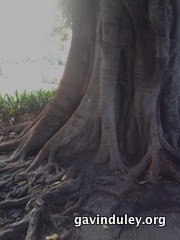
Here is another sample photograph:

Click here for a full-sized file of the above image (note: it's 1.6 megabytes).
More photos:
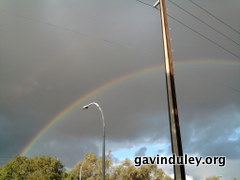
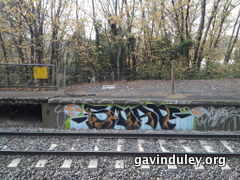
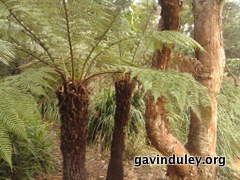
Google Android
A really nice phone operating system, that seems to start to blur the line between phone and computer. Sometimes it does feel more like using a computer than a phone. Which is no coincidence, it is a computer -- but then, so was my Sony Ericsson. This is just a more flexible computer ;-).
Having access to the web and email all the time is surprisingly handy. Google Maps has been a lifesaver many, many times when I've had to try and find my way somewhere. Google's Voice Search can't understand my accent (which is somewhere between a British accent and and Australian accent).
Annoyingly, it is not easily possible for the user to upgrade the operating system unless the manufacturer releases an update. This phone was first designed for Cupcake (Android 1.5), but Samsung supplied an update to Eclair (Anroid 2.1) which came pre-installed on my phone. Now that FroYo (Android 2.2) has been released and seems to be a big improvement again on Eclair, I'd like to try it out. I can't, until Samsung releases an update, if they ever do.
There are unoffical firmwares floating around for most phones, but these normally seem to involve downloading a .zip file off some forum somewhere. Though mostly these are probably 100% safe, I tend to worry a little about malware, especially since there's no way of knowing anything about the person who put the firmware together. Chances are they're just another Anroid enthusiast, but... well, I'm always paranoid. Additionally, as these are unofficial and probably not very widely tested, there is always the possibility of voiding the warranty and killing the phone...
Also annoying is, like a computer, the software can sometimes crash. Quite a few times I've taken the phone out of my pocket only to find that it's frozen completely, and I have to take the battery out and put it back in again to reset it. Sometimes apps crash, or run really slowly, but I guess that's unavoidable.
Grumbles aside, it's a very nice system, and I've come to really like the touchscreen interface. Most things just work as you'd expect, and it's all very nicely thought out. Not quite as elegant as the iPhone system, but it does have the advantage of being a more open system. I'm not sure I'd be willing to move back to another sipler proprietary mobile phone system such as that found on the K750i again, this just seems years ahead.
GPS navigation
The phone's GPS system seems to work, and work well. Using a program called 'GPS Status', I can easily get my co-ordinates, and use the phone's built-in compass.
As noted above, I've also installed an Android port of NavIt. This mostly works well, though sometimes it gives somewhat... eccentric directions. This seems normal for GPSes, though.
My only real annoyance with NavIt is that it does not seem to like quitting cleanly. Mostly, when you ask it to quit it simply hangs. Initially, with the HTC Tattoo, I resorted to removing the battery and putting it back in again to force the phone to reboot. At one point this annoyed NavIt to the point that it stopped working, midway through a daytrip (luckily, I had a printed map with me). I've since installed SystemPanel Lite, which enables me to kill NavIt when it won't play nice. I just hope that it doesn't decide to go on strike again.
It may not be such a problem now since Google Navigation is available in Europe and Australia. I tried this whilst I was back in the UK for a bit recently. It worked okay, though the software and I had a philosophical disagreement about what 'go straight ahead at the roundabout' means. I interpreted this as taking the road at 180° to the road I was currently on. It interpreted it as continuing on the same numbered road as I was currently on, even if this was at 90° to the road I was currently on (i.e., not straight ahead). I still maintain that I am right. This does not help when you're lost due to the large number of wrong turns you have taken... Seriously, it was a big help and helped me find my way around.
I found Google Maps and the GPS to be very useful when finding my way whilst walking. I found this to be invaluable when I visited France recently, and would have got lost a lot without it (my French is too poor to easily ask for directions...). It also helped that I could look up restaurant and winery reviews. I could not look up winery websites as T-Mobile UK blocks these as unsuitable for under-18s. I still haven't gotten around to going to a T-Mobile shop and proving to them that I am, in fact, over 18.
Conclusions
So far, this has been a very nice phone to use, and has done everything I want and more. I'd appreciate a better camera, and to be able to easily get OS upgrades directly from Google, but other than that it's been very good. Battery life is not as good as the K750i (no surprise, given the screen size) but is enough for one and a bit to two and a bit days. It's better to just recharge it every evening though (if you remember!).
It can be very annoying, too. When it works, it works beautifully. Sometimes it seems to slow... right.. down -- normally when I need to look something up in a hurry, or want to show it off to someone. The way it has simply lost mobile connectivity quite a few times is also a worry. I hope it is not a faulty phone...
All in all, a very nice phone (if not 100% reliable), and good value for money.
posted at: 01:50 | path: /computing/android | permanent link to this entry
Foggy morning, Brisbane
Fog hanging apocalyptically over a city,
Fires billowing, set alight by a milky sun
That's just bursting through the cloud - just.
Too grey to be anything but fog,
Too low to be cloud, not really, not any more,
Just a greyness that blots out buildings,
Tears down skyscrapers
And in the morning sun
Defines life.
posted at: 01:50 | path: /soporific | permanent link to this entry
Dead MacBook - deja vu all over again?
Well, the problems I had had previously with my MacBook had come back again. I think, even
though I did manage to revive it last time, that the hard disc still has problems. The
computer boots using the same ELive live CD, just not off the hard disc.
At the moment, it's still dead. I don't have a backup that's as up-to-date as I would like,
so I'll try copying stuff across the network before I reinstall. Interestingly, I can
still read the hard disc when I boot using the Live cd, it just won't boot off it.
Booting from the Mac OS X installer disc, I can run test on the hard disc. The test that
checks the file system reports no problems, but it keeps crashing on the test that tests
file permissions. I wonder if this is the problem, or just a symptom...
Ironically, I was trying to do a backup when it died. I hadn't plugged in my TimeMachine
disc in about 10 days, so plugged it in so it would do a backup. When, after several hours,
it had only backed up a few megabytes I decided something was wrong and so restarted it. I
then tried again. Then my web browser crashed and couldn't be persuaded to restart. I
decided to try restarting the computer, as the backup still wasn't going well.
Unfortunately, this time it decided not to restart...
posted at: 01:50 | path: /computing/mac |
permanent link to this entry
LibraryThing.com
Well, I joined this site a few months back, and sort of half-heartedly added a few books.
Most I added by creating a text file containing ISBNs and a few notes. It was able to grab the data it required of amazon.co.uk.
A few books it didn't seem to know, so I had to add by hand. I used a cameraphone to take shots of the covers for a couple of them, and
this seemed to work surprisingly well.
At the moment, I've just added one shelf of books, plus a number of others that were within reach at the time (aka: on the floor next to me).
If you want to add more than 200 books, you need to pay up. This is only US$25 for 'life time membership', though the fact you can't
currently export your library to a file does worry me a little. I'm not really certain I'll ever have the time to add all my books, either.
Oh well, for the moment a small subset of my library can be found at http://www.librarything.com/catalog/rockhopper_penguin. It may or may not get more complete.
One other thing I'm hoping to try is their Free Advance Review copies. I've added my name for a book, and hope I'll get one. There are, of course,
more people who want copies than there are copies...
posted at: 01:50 | path: /books |
permanent link to this entry
BIOS problems!
It's interesting when you notice obvious computer errors
on public informational computer displays. One bank in Brisbane I sometimes
walk past has a computer display which mostly displays information about the
banks services, but sometimes just displays a blue screen of death.
Well, the one for you here today is from a hospital lift. I won't bother saying
which one. Normally, it displays information along the lines of what is on each floor.
Last week, it was just letting people know that there was a problem with its floppy
disk drive. The lift worked as normal, though...
Note: this image has been rotated 90degrees so that the computer text is the right
way round. In real life the display is mounted sideways and the text saying 'Lift No. 3' is in
fact normally orientated, not sideways.
posted at: 01:50 | path: /stuffisaw/error_messages |
permanent link to this entry
London or Siberia-on-Thames?
Well, that's exaggerating somewhat. Somewhat.
Whilst it wasn't exactly as cold as Siberia, there was a lot of snow.
This is quite odd for London, it doesn't often snow here. It certainly doesn't
often get this much snow, it was quite weird. There were several inches of snow on the ground,
and it just kept snowing the whole day.
Anyway, with no buses and almost no trains, I walked to Greenwich Park.
I haven't seen so many people in Greenwich park before, there were lots of people making snow
men and sliding down hillsides on sleighs, plastic bags, road signs,
real estate signs, or pretty much anything that could resemble a sleigh.
I took as many photos as I could before the battery decided it had had
enough, and died. Still, I think I took some nice photographs: there was snow
everywhere, on every branch, on the heath of Blackheath.
posted at: 01:50 | path: /travel/uk |
permanent link to this entry
Changes to the weblog
The weblog has been moved to a new address --
http://gpd.eu.motd.org/weblog --
to make use of SDF-EU's new MOTD service. This allows SDF'ers to
install and use weblog, wiki and photo gallery software.
It has been available to SDF'ers for a little while, but is new to SDF-EU. If you've
been following this blog with RSS, the new URL is
http://gpd.eu.motd.org/weblog/index.cgi/index.rss.
If you tried to view this weblog over the weekend and kept getting
500 Internal Server errors, my apologies. These resulted from
me trying to install the WriteBack plugin, to allow comments. So far,
no luck. Oh well, I'll have to keep trying.
posted at: 01:50 | path: /this_site |
permanent link to this entry
My Ideal Digital Camera
... doesn't exist.
Okay, that's an exageration. I've used a Canon EOS 5D Mk II, and like it very much. That, along with a choice of L-series lenses, would probably do[1]. It is, however, not in my price range.
The sort of camera I'm after is one that's simple, reliable and manaul. Unfortunately, camera manufacturers believe there are three types of customers:
- "Happy snappers", who want a simple camera that can take decent photographs. They know nothing about shutter speed, aperture or any other photographic jargon, and do not want manual controls.
- Hobbyists/amateurs, who want high quality equipment, with manual controls, and can afford to pay £600+ for a camera body.
- Professionals, who want more or less the same as the amateurs, but need more rugged equipment and have more money to spend.
The people left out are hobbyists with little money, looking for a camera on an "entry-level" budget, but not one that boasts it will avoid exposing you to complex photographic concepts like "exposure compensation" or "manual controls"[2] . If you know how to use a SLR, and want some manual control over the camera, all this is very off-putting.
So, what I'd like is a digital Pentax K1000. Since we're making a digital camera, we may as well add an aperture priority mode (the original K1000 was distinctly manual-only in operation). Autofocus is probably not a priority, though wouldn't spoil the camera -- but then we're starting to move away from the whole "digital K1000" idea.
I'd like it to be simple, rugged and cheap, with good battery life. It needs to be capable of producing high quality photographs, so needs a good sensor. I'd also like to be able to use old Pentax K1000 lenses, please.
Here's where we do hit a problem. If the camera used an APS-C sized sensor, then a 28mm lens would be about the equivilent of a 45mm lens on 35mm -- i.e., standard, not wide-angle. And I like wide-angle lenses. So, we would need a full frame sensor, capable of ISOs from 50 or 100 to 6400 [3].
I haven't looked into pricing, but such things are rarely cheap. This camera should be: it needs to be affordable by students and all hobbyists, not just professionals and well-healed amateurs.
About £200 would be good, £150 would be ideal but probably not realistic.
Other than the full-frame sensor, it could be done. Maybe I'd have to get over my requirement for wide angle lenses -- or maybe the camera manufacturer could make some wide angle lenses to suit it. It wouldn't sell as many units as another auto-everything point and shoot camera, but there would be a good nice market for it.
Who knows? Maybe it might happen, one day.
[1] Irony alert: 'would probably do' is quite an understatement. The EOS 5D Mk II is a beautiful camera. I'll definately buy two, when I win the lottery.
[2] i.e., moi.
[3] I like low light photography, I frequently forget my tripod.
posted at: 01:50 | path: /photography/cameras | permanent link to this entry
Dead MacBook
For a couple of weeks, I had a dead MacBook on my hands (flippers?). I thought I'd write up a quick weblog post, as I've not found much information on the particular problem I had. I'm not certain how common it is, but anyway...
The only symptom was this: the MacBook (1st generation, for what it's worth) would not boot. I got past the Apple start up screen, on to the blue startyp screen. This alternated between a blank blue screen, and one with a circular progress bar. And got no further. I was able to boot from both the Mac OS X DVD and from a Linux live CD -- ELive CD. This showed at least that it was not a hardware problem such as dead RAM.
Initially, I had thought that it was just a dead hard disc, but I was able to mount it okay with the Linux live cd. In addition, I was able to use Disk First Aid on the Mac OS X install DVD, which found no problems with it.
The problem seemed to have just been a software issue -- my guess is it was just a few corrupt startup files. I'm not really certain what caused this -- it could be an early warning of looming hardware problems, or it could just be bad luck. In any case, the only way I found to get it to boot was to reformat and reinstall OS X. Luckily, I had a Time Machine backup of my user files and settings (unfortunately not of the whole system), so this was easy enough. There was an option to transfer files from a Time Machine backup at the point in the OS set up where you can transfer your information from another Mac, and this worked smoothly enough.
Now I just have to hope it keeps behaving itself...
posted at: 01:50 | path: /computing/mac |
permanent link to this entry
Sun Ultra 5
Recently, I put an old 80GB hard disc drive in my Sun Ultra 5, to replace its existing
10GB one. The 10GB one was getting a bit old, and was starting to seem a bit small anyway :-(
The Sun complained loudly when I first booted with the new drive, as it did not have the
appropriate label for a Sun disk. A quick Stop+A then boot cdrom allowed me to boot off the CD-ROM fine,
so I could run the Debian lenny installer.
The installer seems much the same as last time I used it. The main problem I had this time
was in configuring X. For some reason, the installer only asked me questions about my keyboard
and not about my monitor or graphics card. X11 completely failed to work after install.
I soon found out what the problem was by asking a question on the
Humbug general mailing list.
The issue here, though, was changes made in the Linux kernel version 2.6.25 and 2.6.26
apparently broke some things which Xorg depends upon. Going back to version 2.6.22 got rid of the issue,
and Xorg now works fine. The only problem now is still a futex bug that causes firefox to quit
spontaneously after running for a few minutes.
In any case, it's good to have my Sun system back up and working again. It may be "only" 333MHz, but it still
works pretty well...
posted at: 01:50 | path: /computing/unix |
permanent link to this entry
More LibraryThing
Well, I've added two more shelves of books, plus more ones that are just lying around.
In many ways, I can't help thinking that a software package would do the job better in that it would probably allow me to export my
library to other formats -- there are a couple of GPL'ed programs out there. Still, I'm enjoying doing this.
One thing that I hadn't really thought about, though, is the 'social networking' aspects of the site. Though I'm not a great fan of
this in general, it does seem to give this site that 'something extra....'. It's interesting being able to see how many others have
a particular book that you also have, and what they think of it. Some of my books are also owned by loads of people (eg
American Gods by Neil Gaiman), others by just one or two people
(eg The Bumper Book of Lies by Chris Bell, also available
online for free at www.chrisbell.co.nz), a few by no one else at all (eg
An Indian Summer by Sacheverell Sitwell).
The one thing that vaguely worries me a little is that a person's book selections can say quite a bit about them as a person. I'm not certain
exactly what mine says about me (especially given that it is fragmentary so far), or whether I want that much information out in the "public realm".
I'm probably being paranoid here, but anyway.
For the moment, here are some random books from my library, care of Library thing:
posted at: 01:50 | path: /books |
permanent link to this entry
Odd hostname problems
Just for the past few months, my MacBook had been assigning itself a
hostname from the network. Only odd thing is, the network is is on is my
home network, and wasn't set up to hand it a hostname from DHCP.
A quick search on google found that Mac OS X goes through a number of steps
to automatically determine its network hostname:
- The name provided by the DHCP or BootP server for the primary IP address
- The first name returned by a reverse DNS (address-to-name) query for the primary IP address
- The local hostname (set in the Sharing pane of System Preferences)
- The name localhost
Only thing is, it must have been asking my ISP's DNS servers, and ended up getting an odd amalgam of the local internal IP address and my ISP's domain, eg: 192-168-1-5.tpgi.com.au
This was a similar format to the external hostname given to my router by the ISP, which is in the form of 123-456-78-90.tpgi.com.au (where 123-456-78-90 represents an imaginary IP address 123.456.78.90).
Here's what /var/log/system/log showed:
Feb 24 05:03:42 192-168-1-5 kernel[0]: sleep
Feb 24 05:03:42 pippin kernel[0]: Wake reason = USB1
Feb 24 05:03:42 pippin kernel[0]: System Wake
Feb 24 05:03:43 pippin kernel[0]: USB (UHCI):Port 2 on bus 0x1d has remote wakeup from some device
Feb 24 05:03:42 pippin configd[34]: setting hostname to "pippin.local"
Feb 24 05:03:45 pippin kernel[0]: AirPort: Link Up on en1
Feb 24 05:03:47 192-168-1-5 configd[34]: setting hostname to "192-168-1-5.tpgi.com.au"
Feb 24 05:03:47 192-168-1-5 mDNSResponder[22]: NOTE: Wide-Area Service Discovery \
disabled to avoid crashing defective DNS relay 192.168.1.1:53
Feb 24 05:03:49 192-168-1-5 mDNSResponder[22]: Note: Frequent transitions for \
interface en1 (192.168.1.5); network traffic reduction measures in effect
Feb 24 05:03:51 192-168-1-5 Mail[215]: Type selection took over 1.000 seconds. Stopping early....
(some line-wrapping added by me)Obviously, as far as problems go, this was a very minor one. But odd, too -- it really shouldn't have been trying to get a hostname off my ISP, given that the network is behind a NAT firewalled router/"modem". Also, this address was a figment of the computer's imagination: attempting to ping it from within the network failed.
There were a number of suggestions as to how you could force Mac OS X to use a static hostname, but most of these seem to come with a warning as to why you shouldn't do that. In the end, since I am, err, "network administrator" of my home network I just gave myself a static IP address on the router, and told it to give that IP address the hostname I wanted.
This seemed to work:
Feb 25 00:04:04 192-168-1-5 kernel[0]: AirPort: Link Down on en1
Feb 25 00:04:07 pippin configd[34]: setting hostname to "pippin.local"
Feb 25 00:04:21 pippin airportd[3594]: Error: Power unexpectedly off, bailing - Apple80211GetPower() = off (0)
Feb 25 00:04:21 pippin airportd[3594]: Could not find any preferred networks; trying broadcast requests..
Feb 25 00:04:21 pippin airportd[3594]: Error: Apple80211Scan() error 82
Feb 25 00:04:21 pippin airportd[3594]: Error: __performScan() failed (82)
Feb 25 00:04:22 pippin airportd[3594]: Error: Power unexpectedly off, bailing - Apple80211GetPower() = off (0)
Feb 25 00:04:27 pippin login[3573]: DEAD_PROCESS: 3573 ttys001
Feb 25 00:04:41 pippin PubSubAgent[3593]: AgentTask: Daily Tasks took 6756 msec
Feb 25 00:05:07 pippin ntpd[14]: sendto(17.72.255.11) (fd=23): No route to host
Feb 25 00:05:18 pippin login[3603]: USER_PROCESS: 3603 ttys001
Feb 25 00:06:00 pippin kernel[0]: AirPort: Link Up on en1
Feb 25 00:06:07 pippin configd[34]: setting hostname to "pippin.home"
Feb 25 00:06:08 pippin mDNSResponder[22]: NOTE: Wide-Area Service Discovery disabled to avoid crashing \
defective DNS relay 192.168.1.1:53
Feb 25 00:06:12 pippin ntpd[14]: sendto(17.72.255.11) (fd=23): Network is unreachable
Feb 25 00:06:42 pippin login[3623]: USER_PROCESS: 3623 ttys002
I just wonder what exactly it is that it is complaining about with "Wide-Area Service Discovery disabled to avoid crashing defective DNS relay 192.168.1.1:53"...
posted at: 01:50 | path: /computing/mac | permanent link to this entry
Hello, world!
If this is not your first visit to this site, you may have noticed that
after being dormant for some time it has undergone a bit of a facelift.
This was something it had been badly needing for quite some time, but I'd kept
putting off. Especially whilst my honours degree was happening. Now that's over
I have less excuse.
One of the new features is this weblog. This uses
Blosxom, a fairly simple
bit of weblogging software that I am quite fond of.
This is the first ever post on this weblog.
Hopefully there will be many more. In the meantime, please enjoy looking around
the rest of this newly redesigned website!
posted at: 01:50 | path: /this_site |
permanent link to this entry
Twitter!
I finally gave in and made an account on Twitter.
Its http://twitter.com/penguinoid. So far,
I'm just using it to follow other twittererererers that I find interesting for one reason or another.
I'll probably end up posting inanities myself too, though. A horrifying thought...
posted at: 01:50 | path: /computing |
permanent link to this entry
Waiting for Grapes
The first exciting installment of the semester. We've all gone down to the
university's vineyards, and seen the grapes available. My group has
three rows of Syrah and half a row of Mourvèdre.
It's been pretty hot in Adelaide this summer, so
they're already ready in terms of pH, titratable
acidity and brix/baumé (sugar levels). Sadly, they're
not yet ready in terms of
taste, they still taste green.
It's becoming an increasing problem in
Australia with the hot weather, and the only solution seems to be
to wait until they achieve full physiological ripeness and then acidifying
to make up for any lack of acid.
In any case, we'll have to pick soon, as the weather starts to get
hot from Friday, with Friday, Saturday and Sunday predicted to
be 37°C, and Monday 38°C. Pre-cooked grapes is not what
we want.
posted at: 01:50 | path: /wine/oenology_diploma |
permanent link to this entry
Blogging winemaking
At the moment, I'm part of the way through a Graduate Diploma in
Oenology at the University of Adelaide. I haven't written much about it here,
but one of my plans for this year is to start blogging about it. This next semester is
my second and final semester, and I'll be making red wine as part of one of my courses.
I'll try and blog about that, and anything else of interest, here.
Should make a change from the sound of crickets chirping here. And it'll give me
an excuse to get some more practice at writing...
posted at: 01:50 | path: /wine/oenology_diploma |
permanent link to this entry
Deux chevaux vapeur
Or, reasons why the 2CV is not such a bad car after all -
It can be driven across a ploughed field without breaking the basket
of eggs you just happen to have placed on the passenger seat:
Not only that, apparently they're also just pretty good for driving off-road in general:
Hmmm... that last video looks like it's a UK-registered car being driven in Australia. I
wasn't certain that you were allowed to do that...
posted at: 01:50 | path: /cars/oldcars |
permanent link to this entry

